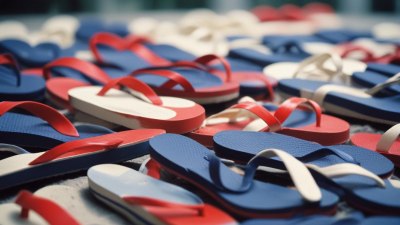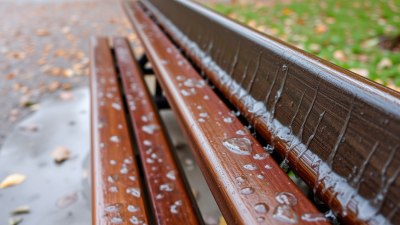The Science of Why Flip-Flops Sound Louder in Humid Weather
Discover the science behind the increased noise of flip-flops in humid weather and how it affects our perception.

This image was created with the assistance of Freepik
As summer rolls in and temperatures rise, many people opt for flip-flops as their footwear of choice. These casual sandals provide comfort and convenience during warm weather, enabling us to enjoy outdoor activities. However, a common phenomenon many have observed is the increased clopping or slapping noise associated with flip-flops in humid conditions. Why do those simple rubber shoes seem to create a louder, more pronounced sound when the air is juicy with moisture? Let's explore the science behind this interesting observation.
Understanding the Anatomy of Flip-Flops
To comprehend the noise produced by flip-flops, it's important to understand their construction. Flip-flops typically consist of a flat sole made from rubber or foam materials, and a Y-shaped strap that goes between the toes and wraps around the sides of the foot. Unlike sneakers or closed shoes that enclose the foot, flip-flops have minimal support and allow for a greater range of motion.
The lack of constraint on the foot when wearing flip-flops is one reason why our steps are more pronounced. The sole does not absorb as much noise as a sneaker would, resulting in that recognizable 'slap' sound, particularly when walking on hard surfaces. However, the role of humidity cannot be overlooked, as it plays a crucial part in amplifying the sound.
The Role of Humidity
Humidity, the measure of moisture present in the air, can significantly influence how sounds are perceived. High humidity levels can cause sound waves to travel differently through the atmosphere. When the air is humid, sound waves are able to carry further and may even become more pronounced. This is partly due to the density of water vapor in the air, which alters how sound travels.
When you walk in flip-flops in humid conditions, the water vapor present in the air may enhance the transmission of sound. The moisture can attach to the flip-flop materials, affecting how they interact with the ground. As our feet slap down, the additional moisture might change the way the rubber or foam meets the surface. The responsiveness of the material could amplify the sound even more, leading to a louder overall noise.
How Sound Waves Work
To delve deeper, we must consider how sound waves travel. Sound is essentially a vibration that travels through the air (or any medium) as waves. In dry conditions, sound waves may dissipate faster due to the density of the air being less than in humid situations. Greater moisture means that sound waves can travel more effectively and farther since humid air is more conducive to sound propagation.
This principle implies that when it's humid outside, ambient sounds—including those created by our footwear—might be louder and carry further than they would during drier spells. Additionally, other environmental factors, such as echoes and surrounding surfaces (e.g., pavement, tiles), can also magnify the sound of flip-flops.
Influence of Environmental Factors
Environmental factors can play a notable role in how loud flip-flops sound. In urban environments with hard surfaces like concrete or tile, sound waves reflect off the surfaces, creating an echo that can make the noise appear even louder. When combined with the effects of humidity, the sound produced by flip-flops can indeed feel amplified.
Moreover, as we mentioned, direct sunlight and dry conditions can create conservative conditions for sound waves, absorbing some of the noise produced. Under humid weather conditions, however, this absorption is reduced, allowing flip-flops to be more audible. Other factors, like the presence or absence of wind, can further complicate how sound is perceived, affecting our overall experience.
The Psychological Aspect
Interestingly, the perception of sound is not solely a physiological phenomenon; psychology plays a significant role as well. In humid weather, the combination of stressors—heat, discomfort, or simply the bustling sounds of summer activities—may heighten our awareness of surrounding noises, including the distinctive sound of flip-flops.
In high temperatures, individuals can become more irritable and distracted, leading to an increased sensitivity to sound. Thus, when we hear the distinct slapping of flip-flops against the foot or pavement, it may seem amplified, echoing our already heightened senses amidst the hustle and bustle of summer.
Social Context and Sound Awareness
In addition to the physiological and psychological aspects of sound perception, social context also shapes our experiences. In summertime scenarios, we may be surrounded by a greater diversity of sounds—from children playing to traffic and outdoor events. The simultaneous occurrence of these sounds can create a louder atmosphere overall, making the sound of flip-flops stand out more than it otherwise would.
When we relax on the beach or walk through a park, the clopping of flip-flops may become part of the complex soundscape of our environment. Sociocultural norms also dictate how we interpret these sounds; in some contexts, flip-flops may even signify leisure and carefree living, contributing further to the collective experience of sound.
Environmental Adaptations
The increase in noise from flip-flops during humid weather can also be viewed as an environmental adaptation. Our ability to adapt to the world around us extends to our interaction with various stimuli, including sound. For many, the casual and carefree sound of flip-flops on a hot, humid day has positive connotations, reminding them of summer fun, vacations, and relaxation.
People tend to adapt to the presence of such sounds, normalizing them as part of their summer routines. While some may find the sound of flip-flops annoying, others may view it as a melodic backdrop to their summertime adventures. Either way, personal experience drives how we interpret these sounds, influenced by context, familiarity, and individual preferences.
Preventative Measures for Noise Reduction
If you find the loudness of flip-flops in humid weather bothersome, there are small changes you can make to reduce noise. Choosing flip-flops made from softer materials may decrease the noise, as they would absorb the sound fluctuations better compared to harder soles. Additionally, wearing flip-flops with thicker soles can help by allowing them to compress more upon impact, reducing the loud slapping sound.
Another option is to consider the surrounding environment. Walking on grass, sandy beaches, or other softer surfaces may help dampen the sound compared to hard concrete areas. By choosing your paths wisely, you can enjoy the casual comfort of flip-flops while minimizing irritating noises.
In conclusion, the phenomenon of louder flip-flop sounds in humid weather can be attributed to a combination of factors including the physics of sound, environmental influences, and individual perceptions. As we dive deeper into how our surroundings shape our experiences, we can appreciate that while noise might be annoying to some, it ultimately reflects a seasonal shift in lifestyle, recreational activity, and the simple joys of summer.
Next time you slip on your favorite flip-flops as the humidity rises, you’ll know the science behind the sound. Embrace the hilarity and charm of these iconic summer sandals and enjoy all that the season has to offer!











